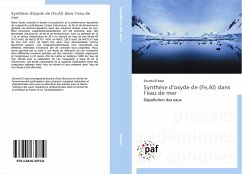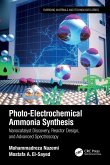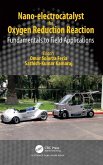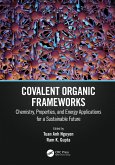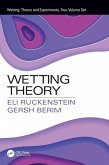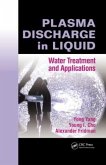Mihir Kumar Purkait, Pranjal Pratim Das, Mukesh Bharti
Electrocoagulation
Fundamentals and Applications in Water and Wastewater Treatment
Mihir Kumar Purkait, Pranjal Pratim Das, Mukesh Bharti
Electrocoagulation
Fundamentals and Applications in Water and Wastewater Treatment
- Gebundenes Buch
- Merkliste
- Auf die Merkliste
- Bewerten Bewerten
- Teilen
- Produkt teilen
- Produkterinnerung
- Produkterinnerung
The book is a concise presentation of different applications of the electrocoagulation treatment process involved in the removal of both organic and inorganic contaminants from drinking and industrial wastewater.
Andere Kunden interessierten sich auch für
![Synthèse d'oxyde de (Fe,Al) dans l'eau de mer Synthèse d'oxyde de (Fe,Al) dans l'eau de mer]() Soumia El BasriSynthèse d'oxyde de (Fe,Al) dans l'eau de mer62,99 €
Soumia El BasriSynthèse d'oxyde de (Fe,Al) dans l'eau de mer62,99 €![Photo-Electrochemical Ammonia Synthesis Photo-Electrochemical Ammonia Synthesis]() Mohammadreza NazemiPhoto-Electrochemical Ammonia Synthesis93,99 €
Mohammadreza NazemiPhoto-Electrochemical Ammonia Synthesis93,99 €![Plant Electrochemistry Plant Electrochemistry]() Antonio Doménech-CarbóPlant Electrochemistry131,99 €
Antonio Doménech-CarbóPlant Electrochemistry131,99 €![Nano-electrocatalyst for Oxygen Reduction Reaction Nano-electrocatalyst for Oxygen Reduction Reaction]() Nano-electrocatalyst for Oxygen Reduction Reaction204,99 €
Nano-electrocatalyst for Oxygen Reduction Reaction204,99 €![Covalent Organic Frameworks Covalent Organic Frameworks]() Covalent Organic Frameworks254,99 €
Covalent Organic Frameworks254,99 €![Wetting Theory Wetting Theory]() Eli RuckensteinWetting Theory196,99 €
Eli RuckensteinWetting Theory196,99 €![Plasma Discharge in Liquid Plasma Discharge in Liquid]() Yong YangPlasma Discharge in Liquid329,99 €
Yong YangPlasma Discharge in Liquid329,99 €-
-
-
The book is a concise presentation of different applications of the electrocoagulation treatment process involved in the removal of both organic and inorganic contaminants from drinking and industrial wastewater.
Produktdetails
- Produktdetails
- Verlag: CRC Press
- Seitenzahl: 198
- Erscheinungstermin: 30. April 2025
- Englisch
- Abmessung: 240mm x 161mm x 15mm
- Gewicht: 467g
- ISBN-13: 9781032796505
- ISBN-10: 1032796502
- Artikelnr.: 72488162
- Herstellerkennzeichnung
- Libri GmbH
- Europaallee 1
- 36244 Bad Hersfeld
- gpsr@libri.de
- Verlag: CRC Press
- Seitenzahl: 198
- Erscheinungstermin: 30. April 2025
- Englisch
- Abmessung: 240mm x 161mm x 15mm
- Gewicht: 467g
- ISBN-13: 9781032796505
- ISBN-10: 1032796502
- Artikelnr.: 72488162
- Herstellerkennzeichnung
- Libri GmbH
- Europaallee 1
- 36244 Bad Hersfeld
- gpsr@libri.de
Dr. Mihir Kumar Purkait is a Professor in the Department of Chemical Engineering at the Indian Institute of Technology Guwahati, Assam, India. His current research activities are focused in four distinct areas viz. i) smart materials, ii) waste to energy, iii) process intensification, and iv) wastewater treatment. In each of the area, his goal is to synthesis stimuli responsive materials and to develop a more fundamental understanding of the factors governing the performance of the chemical and biochemical processes. He has more than 20 years of experience in academics and research and published more than 300 papers in different reputed journals (Citation: >16,500, h-index = 75, i-10 index = 193). He has 12 patents and completed 43 sponsored and consultancy projects from various funding agencies. Dr. Pranjal Pratim Das is a Technical Associate at the National Jal Jeevan Mission (NJJM) under the Ministry of Jal Shakti, Govt. of India. He has completed his PhD from the Department of Chemical Engineering, Indian Institute of Technology Guwahati, Assam, India. He received his M. Tech and B. Tech in Food Engineering and Technology from Tezpur (Central) University, Assam, India. His research work is purely dedicated to industrial wastewater treatment via electrochemical and advanced oxidation techniques. He has extensively worked on the application of hybrid ozone-electrocoagulation process to treat heavy metals and cyanide-contaminated effluents from different unit operations of steel industry. He has authored several scientific book publications, research/review articles and book chapters in various reputed international journals on water and wastewater treatment. He has fabricated and demonstrated many lab-scale modules for the green energy generation from sewage wastewaters. He has also worked on the treatment of ground and surface waters and has delivered many pilot plant set-ups to several water treatment facilities across the state of Assam (India) for the supply of safe drinking water Mr. Mukesh Bharti received his Diploma (2010) in Chemical Engineering from P.M.V. Polytechnic, Mathura, India. He joined Shri Ram Fluorochemicals Ltd. Bhiwadi, Rajasthan, as a Junior Engineer and worked for two years in the Effluent Treatment Plant. He then received his B. Tech in Chemical Engineering from Harcourt Butler Technological Institute (HBTI) Kanpur, Uttar Pradesh, India. Later he joined Frontier Pulp & Paper Mill industry and worked in its Effluent Treatment Plant for four years. After that he obtained his M. Tech and is currently a research scholar in the Department of Chemical Engineering at the Indian Institute of Technology Guwahati, Assam, India. His research is focused on water treatment via magnetic electrocoagulation and membrane processes.
1. An Overview of Water And Wastewater Treatment 2. Introduction to
Electrochemistry 3. Electrocoagulation: Fundamentals and Mechanism 4.
Mathematical Modeling and Simulation of Electrochemical Reactors 5.
Application of the Electrocoagulation Process in Drinking Water
Treatment 6. Application of the Electrocoagulation Process in Industrial
Wastewater Treatment 7. Advancements in a Hybrid Electrocoagulation Process
8. Case Studies on Electrocoagulation Treatment of Water and Wastewater 9.
Environmental and Economic Sustainability of the EC Process 10. Advancement
and Future Research Scope
Electrochemistry 3. Electrocoagulation: Fundamentals and Mechanism 4.
Mathematical Modeling and Simulation of Electrochemical Reactors 5.
Application of the Electrocoagulation Process in Drinking Water
Treatment 6. Application of the Electrocoagulation Process in Industrial
Wastewater Treatment 7. Advancements in a Hybrid Electrocoagulation Process
8. Case Studies on Electrocoagulation Treatment of Water and Wastewater 9.
Environmental and Economic Sustainability of the EC Process 10. Advancement
and Future Research Scope
1. An Overview of Water And Wastewater Treatment 2. Introduction to
Electrochemistry 3. Electrocoagulation: Fundamentals and Mechanism 4.
Mathematical Modeling and Simulation of Electrochemical Reactors 5.
Application of the Electrocoagulation Process in Drinking Water
Treatment 6. Application of the Electrocoagulation Process in Industrial
Wastewater Treatment 7. Advancements in a Hybrid Electrocoagulation Process
8. Case Studies on Electrocoagulation Treatment of Water and Wastewater 9.
Environmental and Economic Sustainability of the EC Process 10. Advancement
and Future Research Scope
Electrochemistry 3. Electrocoagulation: Fundamentals and Mechanism 4.
Mathematical Modeling and Simulation of Electrochemical Reactors 5.
Application of the Electrocoagulation Process in Drinking Water
Treatment 6. Application of the Electrocoagulation Process in Industrial
Wastewater Treatment 7. Advancements in a Hybrid Electrocoagulation Process
8. Case Studies on Electrocoagulation Treatment of Water and Wastewater 9.
Environmental and Economic Sustainability of the EC Process 10. Advancement
and Future Research Scope



